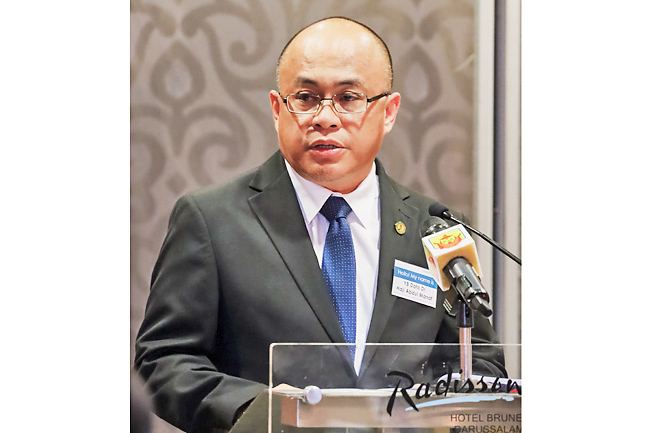Izah Azahari
Navigating through a pandemic crisis was undoubtedly a difficult experience. Now, as the world acclimatises to the new norm, the journey to rebuild the business and reclaim the momentum will be equally challenging. In fact, it may demand greater effort than ever before.
Minister of Primary Resources and Tourism Dato Seri Setia Dr Haji Abdul Manaf bin Haji Metussin said this in a keynote address titled ‘New Opportunities for a New Economy’ during the Transform 2022 Town Hall Forum at Radisson Hotel yesterday.
The COVID-19 pandemic severely disrupted global activity over the past two years, marking it as one of the defining changes to the global economy.
“The pandemic has affected everyone’s business in multiple ways. Those that survived or are now starting up have to deal with the new economy and the new norm.”
However, despite the challenges, the minister called for an optimistic outlook, believing that disequilibrium is identified both as a great threat and a great opportunity.
“We can relate that all challenges are also new opportunities for companies to capitalise on, to grow and sustain their businesses,” Dato Seri Setia Dr Haji Abdul Manaf said.

“Even though the recovery pathway for different economies is uneven, global trade and commodity prices continue to soar, growing steadily and surpassing pre-pandemic levels,” the minister said.
Global economic activity recovery remains incomplete and hampered primarily due to pandemic resurgence, difference in policy support that facilitates economic rebound, supply chain constraints and high inflation.
“For instance, the strict zero-COVID policy in certain countries has affected production and created logistic bottlenecks, thus negatively affecting commodity prices and slowing global economic activities again in the first half of the year,” Dato Seri Setia Dr Haji Abdul Manaf said, adding that the Russian-Ukraine conflict exacerbates the situation.
Discussing how the pandemic has carved out a new economy, the minister said key industrial sectors were dealt major economic challenges. Brunei Darussalam was not exempted from this, feeling the blow to important sectors including tourism, food, health, education and digital trade.
He said the tourism sector has been plagued primarily by challenges such as limited number of tourists; fewer destinations; non-resilient to shocks; lack of infrastructures and human resources; standard compliance issues; and low spending amount by tourists – as reported by Asian Development Bank (ADB) pre-pandemic.
“The abrupt halt on travel or travel restrictions imposed by countries around the world has aggravated the impacts further,” he said, noting the further imbalance to the industry brought on by changes to the way we live and connect through the adoption of digital tools for virtual meetings, incentives, conferences and event tourism.
Dato Seri Setia Dr Haji Abdul Manaf said the pandemic also revealed vulnerabilities in our food systems; the health sector that was stretched thin; the need to convert and adapt to online learning for the education sector; accelerated pace of digital trade not only globally, but also in the Sultanate; as well as the supply chain disruption that has affected nearly all key sectors, highlighting the need to produce and manufacture locally.
“The changes and disruptions over the last two years have resulted in many businesses struggling to stay afloat,” he said, citing a Darussalam Enterprise (DARe) survey from 2021 that suggests more than half of local small and medium enterprises (SMEs) expect revenue losses of at least 50 per cent.



















































